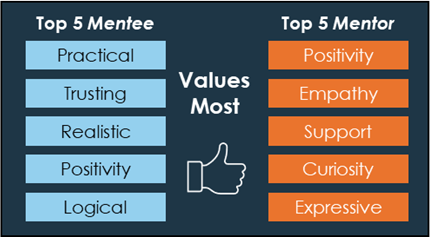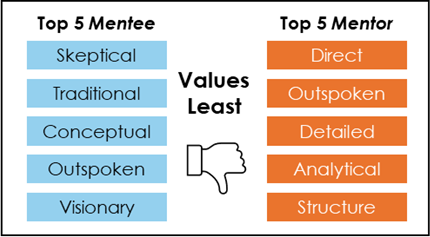Mentoring and coaching is about guidance, growth, and connection, but how well do we understand the core values that drive individuals in these programs?
A deep dive into the data reveals key differences between what mentees (‘early-career professionals’ & graduates) and mentors (experienced leaders & coaches) value most – and least. These insights are crucial for Leaders and HR looking to enhance mentor programs, improve workplace culture, and foster stronger professional relationships.
Mentoring and Coaching isn’t just about sharing experience – it’s about understanding what mentees and mentors truly value in the workplace.


Key Insights for HR & Team Leaders
Mentees value practicality – mentors value emotional intelligence. Mentees want clear, logical guidance, while mentors emphasize support and positivity. Balancing both is essential for a successful mentoring experience.
Trust is a common value – but its meaning may differ. For mentees, trust might mean dependability and consistency, while for mentors, it could mean openness and vulnerability.
Some values are flipped between the two groups!
- “Expressive” is one of the least important values for mentees but a top value for mentors – suggesting that mentees may be more reserved in communication, while mentors encourage open dialogue.
- “Logical” is important to mentees but “Analytical” is one of the least important for mentors – indicating mentees seek structured guidance, while mentors rely on intuition and experience.
Data reveals some prominent points of difference that may seem straightforward don the surface:
- Mentees value practicality, trust, and clear goals, focusing on tangible career growth.
- Mentors prioritise positivity, empathy, and support, with a strong emphasis on emotional intelligence and relationship-building.
But here’s the catch: What people value most is just as important as what they value least. Matching people with opposite values is a recipe for disaster and the impact on the mentoring or coaching relationship can be detrimental to trust development.
What Mentees Value Most
Mentees prioritize practicality, realism, and trust—grounded values that help them navigate their early careers with clarity and confidence. Their top values include:
- Practical – They seek actionable, real-world insights.
- Realistic – They prefer clear expectations and achievable goals.
- Trusting – They value environments where they can depend on others.
- Positivity & Support – They thrive in encouraging workplaces.
- Logical & Adaptable – They appreciate structure but also flexibility.
What Mentees Value Least
Mentees steer away from abstract, theoretical, or highly independent work styles. Their least important values include:
- Skeptical & Traditional – They prefer open-mindedness over rigid structures.
- Outspoken & Expressive – They may hesitate to challenge norms or voice opinions freely.
- Visionary & Conceptual – Big-picture thinking isn’t a top priority yet; they’re focused on tangible, immediate progress.
What Mentors Value Most
Mentors, on the other hand, bring a different lens to the table. They prioritize positivity, empathy, and loyalty, showing a clear emphasis on relationship-building and emotional intelligence:
- Positivity & Enthusiasm – A strong belief in fostering an uplifting environment.
- Empathy & Support – A focus on understanding and helping others grow.
- Curiosity & Adaptability – They value continuous learning and flexibility.
- Fun & Expressiveness – A reminder that mentoring isn’t just about career growth – it’s about connection in a way that matters to both!
What Mentors Value Least
Unlike mentees, mentors place little emphasis on structure, analytical thinking, or rigid independence:
- Directness & Outspokenness – They lean towards nurturing, rather than blunt communication.
- Detailed & Analytical – Unlike mentees, they focus less on logic and more on emotional intelligence.
- Structure – Flexibility is a higher priority than strict processes.
Get in touch to learn how TrustEngine can be your thinking partner to mentoring and coaching success, we’d love to hear from you about your experience.
